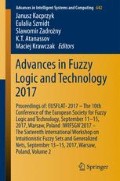Abstract
In this paper we discuss special and inversely special properties for different families of fuzzy implications. We show that a characterization of general binary operations whose residuals become special presented in [B. Jayaram, R. Mesiar, On special fuzzy implications, Fuzzy Sets and Systems 160 (2009) 2063–2085] is incorrect and we present a correct characterization with some additional assumptions. Moreover, we discuss these both properties for R-implications generated from left-continuous t-norms and representable aggregation functions, implications based on copulas, f- and g-implications.
Access this chapter
Tax calculation will be finalised at checkout
Purchases are for personal use only
References
Baczyński, M., Jayaram, B.: Fuzzy Implications, Studies in Fuzziness and Soft Computing, vol. 231. Springer, Heidelberg (2008)
Carbonell, M., Torrens, J.: Continuous R-implications generated from representable aggregation functions. Fuzzy Sets Syst. 161, 2276–2289 (2010)
Dolatia, A., Fernández Sánchez, J., Úbeda-Flores, M.: A copula-based family of fuzzy implication operators. Fuzzy Sets Syst. 211, 55–61 (2013)
Fodor, J., Roubens, M.: Fuzzy Preference Modelling and Multicriteria Decision Support. Kluwer Academic Publishers, Dordrecht (1994)
Grzegorzewski, P.: Probabilistic implications. Fuzzy Sets Syst. 226, 53–66 (2013)
Grzegorzewski, P.: Probabilistic implications. In: Galichet, S., Montero, J., Mauris, G. (eds.) Proceedings of the 7th Conference of the European Society for Fuzzy Logic and Technology (EUSFLAT-2011) and LFA-2011, Advances in Intelligent Systems Research, vol. 1, pp. 254–258. Atlantis Press, Amsterdam (2011)
Jayaram, B., Mesiar, R.: On special fuzzy implications. Fuzzy Sets Syst. 160, 2063–2085 (2009)
Klement, E.P., Mesiar, R., Pap, E.: Triangular Norms. Kluwer Academic Publishers, Dordrecht (2000)
Król, A.: Dependencies between fuzzy conjunctions and implications. In: Galichet, S., Montero, J., Mauris, G. (eds.) Proceedings of the 7th Conference of the European Society for Fuzzy Logic and Technology (EUSFLAT-2011) and LFA-2011, Advances in Intelligent Systems Research, vol. 1, pp. 230–237. Atlantis Press, Amsterdam (2011)
Miś, K.: Directional monotonicity of fuzzy implications, Acta Polytechnica Hungarica (2017, accepted)
Nelsen, R.: An Introduction to Copulas. Springer, New York (2006)
Sainio, E., Turunen, E., Mesiar, R.: A characterization of fuzzy implications generated by generalized quantifiers. Fuzzy Sets Syst. 159, 491–499 (2008)
Trillas, E.: Sobre funciones de negación en la teoria de conjuntos difusos, Stochastica III, pp. (1979). (English translation in: Barro, S., Bugarin, A., Sobrino, A. (eds.) Advances in Fuzzy Logic, Public University, Santiago de Compostela, Spain, pp. 31–45 (1998))
Yager, R.R.: On some new classes of implication operators and their role in approximate reasoning. Inf. Sci. 167, 193–216 (2004)
Acknowledgment
This work was partially supported by the National Science Centre, Poland, through Project Number 2015/19/B/ST6/03259.
Author information
Authors and Affiliations
Corresponding author
Editor information
Editors and Affiliations
Rights and permissions
Copyright information
© 2018 Springer International Publishing AG
About this paper
Cite this paper
Miś, K., Baczyński, M. (2018). Special and Inversely Special Properties of Fuzzy Implications. In: Kacprzyk, J., Szmidt, E., Zadrożny, S., Atanassov, K., Krawczak, M. (eds) Advances in Fuzzy Logic and Technology 2017. EUSFLAT IWIFSGN 2017 2017. Advances in Intelligent Systems and Computing, vol 642. Springer, Cham. https://doi.org/10.1007/978-3-319-66824-6_47
Download citation
DOI: https://doi.org/10.1007/978-3-319-66824-6_47
Published:
Publisher Name: Springer, Cham
Print ISBN: 978-3-319-66823-9
Online ISBN: 978-3-319-66824-6
eBook Packages: EngineeringEngineering (R0)

